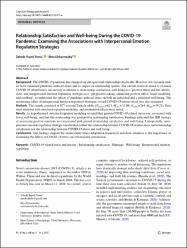| dc.contributor.author | Temiz, Zahide Tepeli | |
| dc.contributor.author | Elsharnouby, Ebra | |
| dc.date.accessioned | 2022-07-21T08:37:29Z | |
| dc.date.available | 2022-07-21T08:37:29Z | |
| dc.date.issued | 2022 | en_US |
| dc.identifier.citation | TEMİZ, Zahide TEPELİ & Ebra ELSHARNOUBY. "Relationship Satisfaction and Well‑being During the COVID‑19 Pandemic: Examining the Associations with Interpersonal Emotion Regulation Strategies". Cognitive Therapy and Research, (2021). | en_US |
| dc.identifier.uri | https://hdl.handle.net/11352/4121 | |
| dc.description.abstract | Background The COVID-19 pandemic has changed our interpersonal relationships drastically. However, few research studies have examined pandemic-induced stress and its impact on relationship quality. The current research aimed to examine
COVID-19 related stress and anxiety in relation to relationship satisfaction, well-being (i.e., positive afect and life satisfaction), and interpersonal emotion regulation strategies (i.e., perspective-taking, enhancing positive afect, social modeling,
and soothing), to understand the efects of pandemic-induced stress on both an individual and a relational well-being. The
moderating efect of interpersonal emotion regulation strategies toward COVID-19 related stress was also examined.
Methods The sample consisted of 877 married Turkish adults (Nfemale=613, Mage=35.00; Nmale=264, Mage=39.21). Data
were analyzed with structural equation modeling, and moderation efects were tested.
Results As hypothesized, structural equation modeling revealed that greater COVID-19 related stress was associated with
lower well-being, and that this relationship was mediated by relationship satisfaction. Findings indicated that IER strategy
of increasing positive emotions was associated with greater relationship satisfaction and well-being. Unexpectedly, interpersonal emotion regulation strategies moderated neither the relationship between COVID-19 related stress and relationship
satisfaction nor the relationship between COVID-19 stress and well-being.
Conclusions Our fndings support the vulnerability-stress-adaptation framework and draw attention to the importance of
examining the efects of COVID-19 stress and relationship satisfaction. | en_US |
| dc.language.iso | eng | en_US |
| dc.publisher | Springer | en_US |
| dc.relation.isversionof | 10.1007/s10608-022-10317-w | en_US |
| dc.rights | info:eu-repo/semantics/openAccess | en_US |
| dc.subject | COVID-19 Related Stress and Anxiety | en_US |
| dc.subject | Relationship Satisfaction | en_US |
| dc.subject | Marriage | en_US |
| dc.subject | Well-being | en_US |
| dc.subject | Interpersonal Emotion Regulation | en_US |
| dc.title | Relationship Satisfaction and Well‑being During the COVID‑19 Pandemic: Examining the Associations with Interpersonal Emotion Regulation Strategies | en_US |
| dc.type | article | en_US |
| dc.relation.journal | Cognitive Therapy and Research | en_US |
| dc.contributor.department | FSM Vakıf Üniversitesi, Edebiyat Fakültesi, Psikoloji Bölümü | en_US |
| dc.contributor.authorID | https://orcid.org/ 0000-0001-6980-1226 | en_US |
| dc.contributor.authorID | https://orcid.org/ 0000-0002-3372-780X | en_US |
| dc.relation.publicationcategory | Makale - Uluslararası Hakemli Dergi - Kurum Öğretim Elemanı | en_US |
| dc.contributor.institutionauthor | Temiz, Zahide Tepeli | |



















